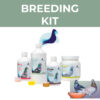Healthy Gut Bacteria in Pigeons Optimizing Performance and Wellness
Maintaining optimal gut health in pigeons is one of the most overlooked yet essential factors in promoting their overall well-being and racing performance. A balanced gut microbiome not only aids digestion but also strengthens immunity, improves nutrient absorption, and provides a line of defense against harmful pathogens. Whether you are a seasoned pigeon fancier or new to the sport, understanding the critical role gut bacteria plays in avian health is crucial for ensuring long-term vitality in your flock.
In this comprehensive guide, we’ll explore why healthy pigeon gut bacteria is essential, the consequences of gut dysbiosis (imbalanced gut flora), and the best pigeon probiotics and supplements that support a thriving digestive system. We’ll also dive into how dietary choices, loft hygiene, and targeted treatments can work together to enhance gut flora and maximize performance.
Why Gut Health Matters for Pigeons
The gastrointestinal (GI) tract of a pigeon, like that of any animal, is home to trillions of microbes—mainly beneficial bacteria. These microorganisms play a vital role in the digestive process by breaking down complex food materials, synthesizing essential vitamins (like B-complex and vitamin K), and protecting the host from opportunistic infections.
Key Functions of Healthy Gut Bacteria:
- Enhanced Digestion and Nutrient Absorption: Proper bacterial populations help pigeons absorb key nutrients including amino acids, calcium, and magnesium.
- Stronger Immune Defense: Around 70% of a pigeon’s immune cells are located in the gut. A healthy microbiome helps activate immune responses and block harmful invaders.
- Disease Prevention: Beneficial bacteria inhibit colonization of pathogens like Salmonella, E. coli, and Clostridium by outcompeting them for space and resources.
- Stress Management: During racing, training, breeding, or environmental changes, pigeons face physical stress. A healthy gut flora can reduce the negative impact stress has on their system.
Signs of Unhealthy Gut Bacteria in Pigeons
Gut dysbiosis can result in a wide range of health problems, including:
- Diarrhea or inconsistent droppings
- Weight loss despite good appetite
- Reduced racing performance
- Weak immunity and susceptibility to infections
- Dull feathers and poor recovery after flights
By recognizing these signs early, pigeon fanciers can take corrective steps and prevent more serious complications from developing.
What Affects Gut Flora in Pigeons?
There are several factors that can disrupt the delicate balance of gut microbiota in pigeons:
1. Antibiotic Overuse
While antibiotics can treat bacterial infections, they also kill beneficial bacteria. This often leads to an imbalance in the gut and opens the door for harmful organisms to take hold.
2. Poor Nutrition
Diets lacking in diversity or essential nutrients can reduce the populations of good bacteria, weakening the bird’s digestive and immune systems.
3. Stress
Transport, loft changes, extreme temperatures, breeding, and racing stress can reduce microbial diversity and gut barrier integrity.
4. Contaminated Feed or Water
Moldy grains, stale water, and improperly stored feed can introduce harmful microbes and toxins that disrupt gut balance.
5. Infections and Parasites
Diseases such as Canker (Trichomoniasis) and Coccidiosis severely impact gut health, destroying beneficial bacteria and the protective mucosal lining.
How to Improve Gut Health in Pigeons
Ensuring the right conditions and supplements for your pigeons will help foster a balanced gut microbiome. Below are proven methods to support a healthy digestive system:
1. Use Probiotics for Pigeons
Probiotics are beneficial microorganisms that help restore gut flora. These can be administered in powder or liquid form and are particularly useful after antibiotic treatment or periods of stress.
Recommended Probiotic Products:
- Ropa-B Probiotic: Contains live Lactobacillus cultures; promotes healthy gut and immune function.
- Aviform Prolyte-P: Combines probiotics with electrolytes to support hydration and recovery.
- Versele-Laga Oropharma Probi-Zyme: Offers a mix of enzymes and probiotics to aid digestion and improve gut health.
2. Include Prebiotics in the Diet
Prebiotics are non-digestible fibers that feed beneficial bacteria. Ingredients like inulin or mannan-oligosaccharides (MOS) help stimulate the growth of good gut flora.
Foods with Prebiotic Benefits:
- Garlic powder
- Brewer’s yeast
- Chicory root extract
3. Add Apple Cider Vinegar (ACV)
Raw, unfiltered ACV with the “mother” can help regulate pH levels in the gut and promote healthy bacterial growth. Add 5–10 ml of ACV per liter of water 2–3 times per week.
4. Offer Grit and Mineral Supplements
Pigeons require insoluble grit to aid in mechanical digestion. Some types of grit also contain natural clay and charcoal, which detoxify the gut.
Recommended Products:
- Performance Pigeon Mineral Grit
- Natural Redstone Grit – Enriched with calcium, charcoal, and minerals.
5. Feed High-Quality Grain Mixes
Well-balanced grain mixes contain varying fiber and nutrient levels that support digestive function.
- Avoid dusty, moldy, or outdated feed.
- Rotate grains to keep the gut flora diverse and active.
Post-Antibiotic Recovery Protocol
After treating birds with antibiotics for conditions like Canker, Salmonella, or Respiratory Infections, restoring gut flora should be a top priority.
Steps:
- Provide a high-strength probiotic for 5–7 days.
- Add ACV and garlic extract to water for immune support.
- Feed fresh, clean, high-quality grain and grit.
- Monitor droppings and overall condition.
Loft Hygiene and Its Impact on Gut Health
Clean lofts significantly reduce exposure to harmful microbes. Regular disinfection and dry bedding keep bacterial and fungal loads low, preserving the integrity of your pigeons’ microbiome.
Hygiene Tips:
- Clean droppings daily.
- Disinfect waterers and feeders weekly.
- Keep perches, nest boxes, and floors dry.
- Ensure good airflow and ventilation.
Gut Health During Breeding and Racing
During breeding and racing seasons, pigeons face extra physiological demands. Supplementing with gut-supportive products can give your birds a competitive edge.
During Breeding:
- Boost probiotic intake to pass beneficial flora to chicks.
- Use immune-boosting herbs like oregano and echinacea.
During Racing:
- Provide electrolyte-probiotic mixes post-race to aid recovery.
- Use gut conditioners to prevent infections from stress and exposure.
Monitoring Gut Health: What Droppings Reveal
The state of your pigeons’ droppings is a visual clue to their digestive health:
- Firm, dark droppings – Healthy gut flora.
- Greenish or watery droppings – Poor digestion, stress, or illness.
- White, chalky droppings – Possible kidney issues or dehydration.
Observing droppings daily and adjusting feed, supplements, or care based on what you see is an effective early-warning system.
Conclusion
Healthy gut bacteria are foundational to pigeon health, influencing everything from digestion and immunity to performance and recovery. By prioritizing gut health through quality nutrition, targeted supplements, and careful loft management, you can give your birds the best chance to thrive.
Whether preparing for a major race or simply raising a healthy flock, supporting the microbiome is a step every pigeon fancier should take seriously.
Top Products for Pigeon Gut Health:
- Ropa-B Probiotic
- Versele-Laga Probi-Zyme
- Apple Cider Vinegar
- Natural Redstone Grit
- Aviform Prolyte-P
- Performance Pigeon Mineral Mix
By integrating these strategies and products into your pigeon care routine, you’ll help your birds soar to new levels of health and success.


